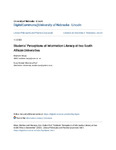| dc.description.abstract | Information literacy, the ability to find and use information ethically, has been on the
agenda of academic librarians for a very long time now. The driving force behind the
information literacy agenda is the over-abundance of information, particularly online,
as a result of rapid changes and developments in technology (Tosuncuoglu &
Küçükler, 2019). There is a general shift in the publications industry, with increasingly
more information being published online and this has resulted in an influx of
information available to users in general and to students in particular. The current
COVID-19 pandemic has added more impetus to the critical value of information
literacy as fake news infodemic has risen to levels demanding high critical thinking
skills (Durodolu & Ibenne, 2020; Guo & Huang, 2021). Seemingly, academic integrity
has once again become a major issue on campus as students became overwhelmed
by the sudden transition from contact teaching and learning, to the online modality
which has enabled the continuation of the University’s core business under the
Coronavirus environment. From a practical experience, the authors have experienced
a surge in instances of plagiarism resulting in punitive policies being invoked on
offenders in order to help reduce the cases. Librarians, as custodians and facilitators
of access to information of all kinds, have a huge role to play in ensuring that students
acquire the necessary skills in order to properly handle information. The South African
University System is usually classified into historically advantaged and historically
disadvantaged. Students joining the historically advantaged institutions usually
originate from the rich urban families while those attending the formerly disadvantaged
institutions come from mostly rural based schools without access or with limited
access to libraries and technology of all kinds. If our primary and secondary education
system was adequately paying attention to learners’ information handling skills
including the entire digital skills spectrum, information literacy would not be a major
concern at the higher education level. This background information which include the
renewed need for information literacy education during the ongoing COVID-19
pandemic, motivated the researchers to rework and share this outcome from a study
conducted some few years back. | en_US |

